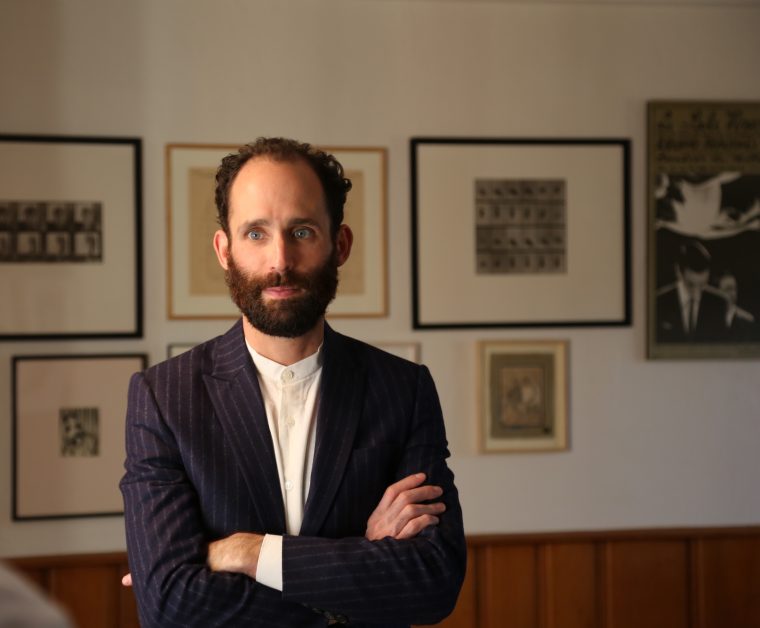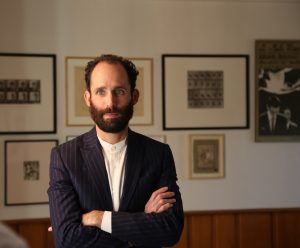Fels ’06 Wins Gates Grand Challenges Explorations with macro-eyes Health Care Initiative


“Pattern recognition was a constant in my explorations at Wesleyan—and what I focused on afterwards,” says Benjamin Fels ’06, explaining the unity behind a seeming diversity of interests.
The Bill and Melinda Gates Organization is interested, also, in what Fels finds intriguing. The company Fels co-founded, macro-eyes, is one of 20 that the foundation selected to be a Grand Challenges Explorations winner. The project that macro-eyes proposed seeks to use their own breed of statistical machine learning, trained on supply chain and immunization data at health facilities in Tanzania. The goal is to maximize the number of children who get vaccinated and minimize vaccine wastage.
Fels and his partners believe that by adding important data, information and observations from health-care workers at the site, they will be able to train and test algorithms, which will learn to identify predictive patterns to forecast demand and recommend the optimal delivery of vaccines to each site in the program.
At Wesleyan, Fels was an art history major who wrote an interdisciplinary University Major Honors thesis with advisor Khachig Tölölyan, professor of Letters and English. “He knew the kinds of topics he was interested in and the things he liked—but the exploration of the things he liked weren’t easily available within a departmental structure,” recalls Tölölyan. “Both of us wanted to think hard in the ways we wanted to think and not worry too much about whether a single discipline could comfortably accommodate that.”
Post-graduation, Fels spent a number of years trading derivatives, which he describes as, “I sat in front of 12 computers, dense with data, looking at patterns; working with technology and people from other cultures to develop algorithms to predict what came next. I really liked the rigor and clarity of it.” After a while, though, he sought to take his interest in pattern recognition in another direction, launching his company, macro-eyes, with a chief scientist who is also a principal research scientist at MIT, and a chief design officer.
“Machine learning—data analytics, or working with large amounts of data to discern those predictive patterns—is important in other domains outside of financial markets, so I went and founded a company,” he explains. Fels and his team are convinced that macro-eyes can solve the problem of ineffective health-care supply chains by harnessing effective machine learning paired with on-the-ground human information.
Fels initially became interested in this specific application of this theory through talking with Anna Talman Rapp ’05, a program officer at the Gates Foundation, which invests heavily in the development of vaccines, a crucial component of the global health climate. At the time, macro-eyes was working with a large U.S. health-care system, exploring questions around determining the value of different devices: which produced the best outcome for the lowest price for which type of patients.
The problem of predicting need captured his imagination: “On one hand, we could celebrate the effectiveness of vaccine delivery,” he says, “because on a global scale, more and more people are vaccinated against deadly diseases—global coverage is something like 86 percent. However, as more and more people are vaccinated, there’s a greater rate of coverage that will run in parallel to a greater wastage of vaccine. The approach so far has been to accept that as the cost of doing business.”
But the cost of vaccines has skyrocketed. Additionally, the vaccines themselves are fragile, with a limited shelf life and narrow range of temperatures in which they remain viable. Over-delivery practically guarantees some will spoil before they can be used—a waste of resources. In Fels’s mind, what is worse is undersupply.
“Let’s think about this one clinic in Arusha, Tanzania, that we’re going to work with: Let’s say, I decide to take my child to this clinic to be immunized. And I spend a good portion of my day traveling from where I live to get to this site. And when I get there, I’m told, ‘Sorry, we’ve run out of those vaccines.’ Rationally enough, I’m probably not going to come back. And even more dangerously, I’m probably going to tell my community, ‘Don’t bother to take your kids to get immunized, because they’re going to tell you that there aren’t any vaccines.’”
What he proposes is to use technology to much more accurately predict demand. Growing out of data from immunization events, he believes that patterns will emerge that can be translated to quantity and type of vaccine to be delivered. “The better you get, the less waste, more opportunity you have to provide the health care to the people who need it.”
Additionally, a key element Fels sees is: “We want to engage these caregivers at the frontline, get their information—and I use that word very carefully because information is many steps up from data; it’s filtered through somebody’s brain and understanding—about the context for care. We believe that these are people who are the world’s foremost experts on the delivery of care at that clinic in Arusha; nobody else knows more than they do; they have this deeper insight into what is happening around them.”
From there he notes a connection to health care in this country: “You’ve probably read about how many doctors spend probably about half their day entering data. And you see this when you go to a doctor, typing away. That frustrates them, because they feel like, ‘That’s not what I trained to do.’ The data collection doesn’t seem important—and the reason is, it’s not flowing out and bouncing back with insights that would make their data collection worthwhile, an ‘Okay, this is why I’m making this investment.’ If we collect data, the initiative must be worthwhile for everybody.”
“I think of this health care project in terms of problems worth solving—and finding those has always interested me. I like the interdisciplinary aspect. And I would bet that everyone who goes through Wesleyan thinks in similar terms. That’s the point, right? To solve a problem that is worthwhile.”

